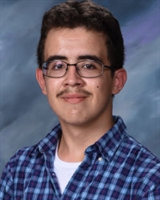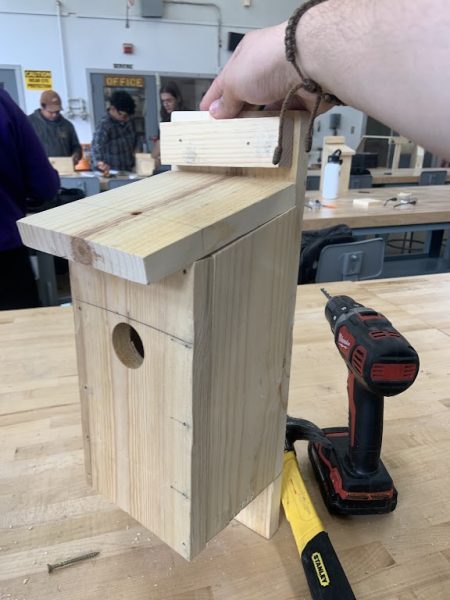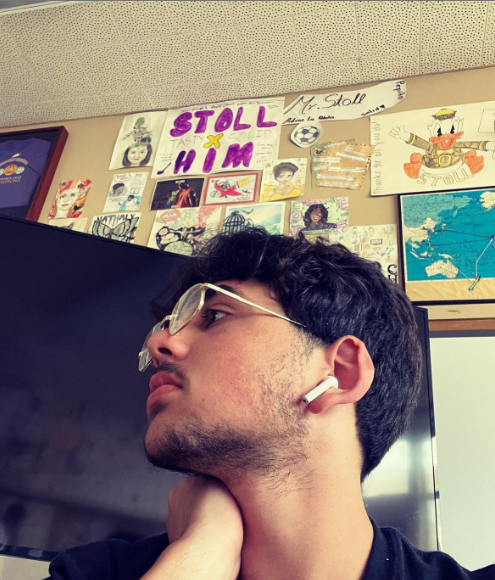Drill and more via Google Classroom
In this class – ROTC

More than a class, ROTC offers a future in or out of the military.
The Reserve Officers Training Corps (ROTC) is a group of college and university-based programs for training commissioned officers of the United States Armed Forces. Armijo High School has had Junior ROTC, or JROTC, program since 1972, now they are halfway through the 49th year of the program.
Back in the twentieth century, “the Air Force felt there was a need to assist high school students in our city to have a new pathway into military service,” said Colonel Edward Bruce.
Colonel Bruce and SSgt Janet Santa have been running the JROTC program for years, but before that they both served in the Air Force. “I have always enjoyed teaching, and I knew by teaching this course I could use the experiences I had while in the Air Force to help students reach their potential,” said Colonel Bruce. “I am also amazed at how much I learn from the students.”
Covid-19 has impacted schools in a variety of ways. Certain things like sports and programs have shut down. Because of that, JROTC cadets can’t have the same training they had before school Distance Learning.
“Admittedly, this has been a difficult year! We are doing our best, though,” Colonel Bruce said. “We still strive to ensure our students learn as much as possible about the military, including having military recruiters talk to our students via Google Meets…While we haven’t been able to do everything we normally do, such as parades and drills, we hope to make up for that when we return to the classroom.”
In JROTC, when events were still happening on campus, students were responsible for training, wearing their uniforms in the proper fashion, drills and more. Now the cadets have to take their classes online, which can be a challenge since the program has a history of observable behavior and activity, things that don’t translate well in a Google Meet.
Colonel Bruce and SSgt Janet Santa stay in touch with the cadets, and the cadets stay in touch with each other via Google Meets, Facebook, texting, and more.
“I think most of our students are dealing with this situation pretty well,” said Colonel Bruce. “We give them time to talk about their individual situations, helping them know we are here and always available to them if and when they need us.”
JROTC was designed to show high school students what the military can offer as a career. However, joining the military after graduation is not a requirement of the course.
The focus is to help students become the best citizens they can be.
JROTC program is more than just a class. It focuses on several areas:
Aerospace Science Class: The first and second year cadets learn the history of man’s attempts at learning how to fly, and the principles and physics of flight. The course also includes aerospace physiology, the study of what happens to the human body at high altitudes and low atmospheric pressures.
Leadership Class: The first year cadets learn about the Air Force, including the customs and traditions. The cadets in other years learn how to rent an apartment and buy a car, how to follow a budget and apply for credit scores and how to apply for credit.
Wellness/ Physical Training: The cadets learn how to eat right and have proper nutrition, as well as good exercises to keep fit.
“We adhere to the US Air Force’s motto of ‘Integrity first, service before self, and excellence in all we do’,” Colonel Bruce said. “Our emphasis is on helping our students succeed in whatever field they choose after graduation.”
Many of the cadets that graduate go on to go to colleges and join the regular ROTC program. In some cases, they enlist into the military right after high school, taking advantage of the experience they’ve received from the JROTC program. ““If they are in JROTC three years they will advance in rank ahead of others, thereby earning a higher starting salary.”
“Cadets in JROTC do not attend military basic training while still in high school. However, they can enlist while still in high school to get an early entry date into the military if they desire” Colonel Bruce said.
Taking the ROTC program is not enough to prepare a student for a career in the military. “If a cadet chooses to enlist in the military, he or she must first take the Armed Forces Vocational Aptitude Battery (ASVAB). This aptitude test is used to determine what area or specialty best suits you. While in high school, you can take it up to twice a year, and you can take it multiple times to get a higher score, and the higher you score on the ASVAB, the more specialty areas will be open to you,” said Colonel Bruce.
To find out more about ROTC, students can send a message to Colonel Bruce at [email protected] or to SSgt Santa at [email protected].

Aldo Suarez is an artist. A resident of California, he is a very kind and helpful, always wanting to help people no matter what. He has always found creativity...




